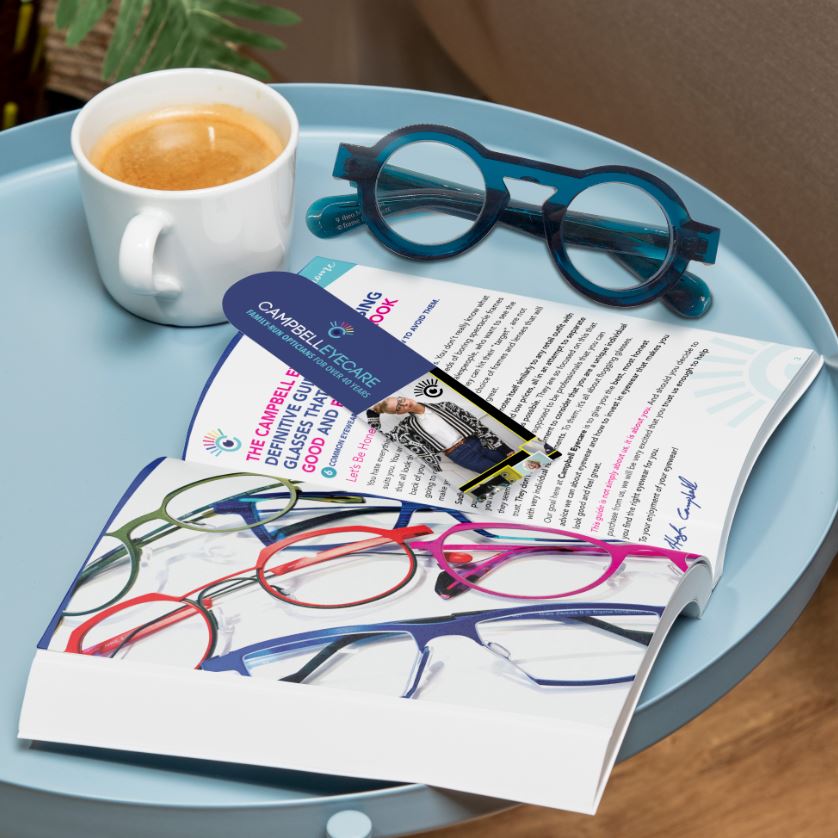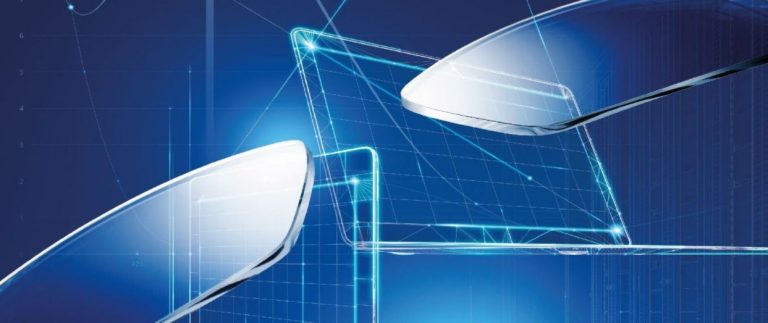
When it comes to preventing eye strain and fatigue, do blue light filter glasses really work? Blue light glasses, which are glasses with special lenses that are designed to filter out blue light, have seen a surge in popularity in recent years as wearers seek to mitigate eye strain, increase focus and even get better sleep at night. Just what benefits do these blue light glasses offer the wearer, and what are the real effects of blue light on the eyes? We’re setting out the facts to help you make an informed choice about whether blue light glasses are right for you.
Our eyes are constantly working to interpret the visible spectrum of light. Blue light is just one part of this visible spectrum, which when combined with red, orange, yellow, green, indigo and violet, make white light – the kind we see in sunlight. If you have ever witnessed the well-known physics experiment of refracting sunlight through a prism, you will have seen how white light splits into the different bands of colours that make up the visible light spectrum.
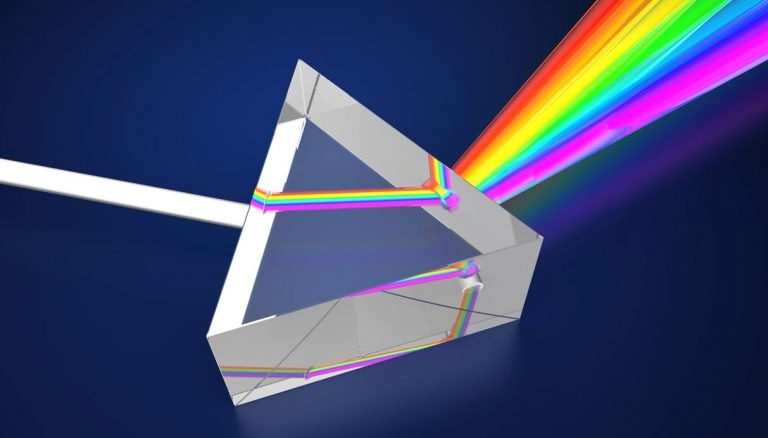
Each of the colours that make up this spectrum contain different wavelengths of energy. On the red end of the spectrum, the wavelengths are longer, which means they contain less energy. In fact, stray too far into the red and you’ll find infrared light – with wavelengths so weak that they aren’t visible to the human eye. Blue light, on the other hand, has shorter wavelengths and contains the most energy. Dial this energy even further and you’ve got ultraviolet (UV) light. This light is invisible, but contains enough energy for plants to photosynthesise and to give us a tan with enough exposure.
In fact, sunlight just happens to be the largest source of blue light that most of us are exposed to, but this isn’t the whole story. Blue light is everywhere around us, now more than ever. Artificial lighting that you may come across in indoor spaces, and other sources such as LED screens on devices such as laptops and smartphones, have become an almost inescapable feature of our lives. The danger of constant exposure to blue light throughout the day has been a topic of study for many years, with eye strain and disturbances to natural sleep patterns the chief reasons why people have increasingly turned to blue light glasses.
Do blue light blocking glasses reduce eye strain?

Blue light, having the highest energy output of the visible spectrum, is poorly absorbed by the eye. The short-wavelength light instead scatters, which means the eye can’t focus on it as easily. Computer and phone screens emit this blue light at a high rate, and for people who spend long periods of time looking at these screens, the result can be overworked, irritated eye muscles. This is what we know as eye strain – most often seen in the common trope of the office worker who rubs their eyes after a long day working at their computer.
Blue light blocking glasses may help to reduce eye strain with special lenses that are designed to decrease the amount of blue light that enters the eye. Nikon’s SeeCoat Blue UV lenses achieve this by blocking the high-energy blue light while letting other colours in the spectrum shine through. The eye finds it easier to focus on the lower-energy light, meaning less squinting and straining. This blue-light blocking also helps optimise image contrast, meaning the eye can more easily differentiate between dark and light tones, both on screens and within the general environment.
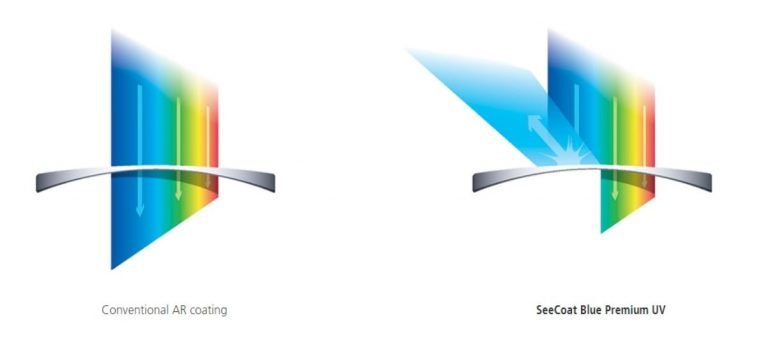
Do blue light filter glasses work to help you sleep?
We know that blue light has a high-energy wavelength. This causes the light to scatter rather than be absorbed, and can make it harder to focus. But blue light has also been associated with sleep disorders and difficulty switching off at night. Studies suggest that this happens because blue light may affect your body’s wake-sleep cycle, also known as your circadian rhythm. If you’ve ever found it difficult to nod off after a night spent looking at a computer screen, blue light could very well be the reason.
Sunlight is made up of the full spectrum of colours, including blue. During the day this light enters our eyes and tells our natural systems that it’s daytime. This makes us feel awake and alert – our bodies achieve this by suppressing the production of a hormone called melatonin. As the sun sets, this blue light reduces, prompting us to start producing more melatonin as we prepare to rest. This natural rhythm is what allows us to get our heads down and get good quality sleep at the end of a long day.
As we know, devices such as computers and phone screens emit high levels of blue light. It’s not uncommon for people to use their devices right up until the time they go to sleep, meaning that their eyes are continuously exposed, potentially affecting their natural hormone balance. If blue light makes us feel more awake and alert, it’s no wonder that it’s more difficult to drop off after spending time in the evening being continuously bathed in it.

Are blue light glasses the same as anti-glare glasses?
Glare is strong or dazzling light, which reduces the clarity of the image you see. Strong sunlight reflected from surfaces such as water and glass can cause glare, as can the headlights of cars when driving at night. Anti-glare lenses work a little bit like blue light blocking lenses, but in a different way. While blue light blocking lenses have a special coating that reduces blue light entering the eye, anti-glare lenses use an anti-reflection coating that actually lets more light through. By stopping light from reflecting on the lens surface and instead allowing it to pass through freely, this reduces the light scattering effect that causes glare.
Glare can cause eye strain as it forces you to squint your eyes to mitigate the effect, but this is not the same as the strain caused by blue light. Lenses are usually either blue-light blocking or anti-glare. It is advisable to keep different pairs of glasses for different citations – such as one pair for working with screens and reducing blue light, and another for driving or bright light situations. Nikon’s SeeCoat Drive lenses provide the perfect level of anti-glare protection to keep you safe and seeing well on the road.
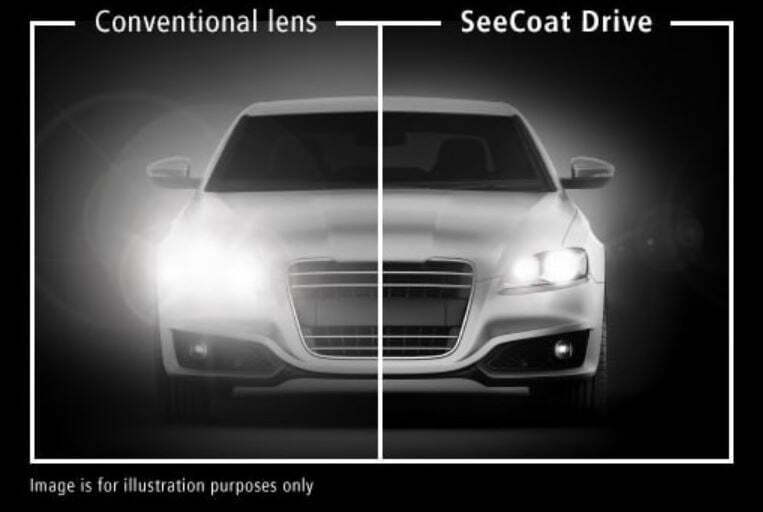
Not sure if blue light blocking glasses are right for you?
Blue light blocking lenses are great for relieving the symptoms of eye strain and limiting the potential effect of blue light on your natural rhythm. If you lead a digital lifestyle and find yourself using screens more than the average person, you may benefit from blue light filtering lenses such as Nikon’s SeeCoat UV Blue. As mentioned, there are different types of lenses that are suitable for most types of work and leisure situations, such as the SeeCoat Bright range that prioritises colour perception and contrast, or Nikon’s photochromic lenses that automatically transition and adapt to variable light levels in the environment.
When choosing the correct lenses for your situation, it’s important to get the right advice. At Campbell Eyecare we don’t rush – we take the time to sit down with you and learn about your lifestyle before making recommendations about which lenses will provide the most benefit. We can also demonstrate the difference that different kinds of lenses make so you can compare the effects before making a decision. Give our friendly team a call on 01349 882 863 (Alness) / 01862 892 559 (Tain) to learn more about the different types of lenses we offer and to arrange your checkup with us today.
Sources used for this article:
High sensitivity of the human circadian melatonin rhythm to resetting by short wavelength light – Steven W Lockley, George C Brainard, Charles A Czeisler
https://pubmed.ncbi.nlm.nih.gov/12970330/
The inner clock-Blue light sets the human rhythm – Siegfried Wahl, Moritz Engelhardt, Patrick Schaupp, Christian Lappe, Iliya V Ivanov
https://pubmed.ncbi.nlm.nih.gov/31433569/
How Blue Light Affects Sleep – Rob Newsom, Dr. Abhinav Singh
https://www.sleepfoundation.org/bedroom-environment/blue-light
